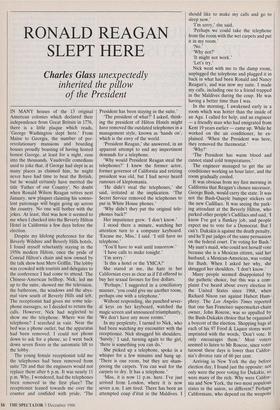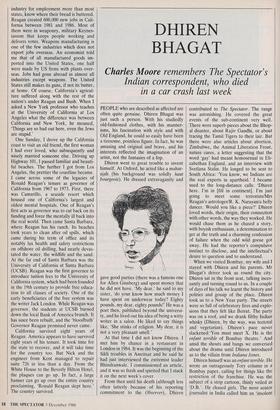RONALD REAGAN SLEPT HERE
inherited the pillow of the President
IN MANY houses of the 13 original American colonies which declared their independence from Great Britain in 1776, there is a little plaque which reads, 'George Washington slept here.' From Maine to Georgia, the number of pre- revolutionary mansions and boarding houses proudly boasting of having hosted honest George, at least for a night, runs into the thousands. Vaudeville comedians used to joke that, if George had slept in as many places as claimed him, he might never have had time to beat the British, but he would certainly have merited the title 'Father of our Country'. No doubt when Ronald Wilson Reagan retires next January, new plaques claiming his somno- lent patronage will begin going up across the country. No one will bother with the jokes. At least, that was how it seemed to me when I checked into the Beverly Hilton Hotel in California a few days before the election.
Despite my lifelong preference for the Beverly Wilshire and Beverly Hills hotels, I found myself reluctantly staying in the 1950s modern Hilton, once the pride of Conrad Hilton's chain and now owned by the talk show host Mery Griffin. The lobby was crowded with tourists and delegates to the conference I had come to attend. The Chinese-American bellhop, Nick, led me up to the suite, showed me the television, the bathroom, the windows and the abys- mal view south of Beverly Hills and left. The receptionist had given me some tele- phone messages, so I decided to return the calls. However, Nick had neglected to show me the telephone. Where was the telephone? I searched in vain. Near the bed was a phone outlet, but the apparatus had been removed. I could not phone down to ask for a phone, so I went back down seven floors in the automatic lift to the lobby.
The young female receptionist told me the telephones had been removed from suite 726 and that the engineers would not replace them after 6 p.m. It was nearly 11 p.m. Why, I wondered, had the telephones been removed in the first place? The receptionist leaned towards me over the counter and confided with pride, The President has been staying in the suite.'
'The president of what?' I asked, think- ing the president of Hilton Hotels might have removed the outdated telephones in a management style, known as 'hands on', which is the envy of the world.
'President Reagan,' she answered, in an apparent attempt to end my impertinent demands for a telephone.
'Why would President Reagan steal the telephones?' I knew the former actor, former governor of California and retiring president was old, but I had never heard rumours of kleptomania.
'He didn't steal the telephones,' she said, irritated at the implication. 'The Secret Service removed the telephones to put in White House phones.'
'Why didn't they put the original tele- phones back?'
Her impatience grew. 'I don't know.'
I stood there a minute, watching her attention turn to a computer keyboard. 'Excuse me, Miss,' I said. 'I still have no telephone.'
'You'll have to wait until tomorrow.'
'I have calls to make tonight.'
'I'm sorry.'
'Is this a hotel or the YMCA?'
She stared at me, the hate in her Californian eyes as clear as if I'd offered to buy her sexual favours for five dollars.
'Perhaps,' I suggested in a conciliatory manner, 'you could give me another room, perhaps one with a telephone.'
Without responding, she punched sever- al keys on her keyboard, watched the magic screen and announced triumphantly, 'We don't have any more rooms.'
In my perplexity, I turned to Nick, who had been watching my encounter with the receptionist. Nick shrugged his shoulders. 'Surely,' I said, turning again to the girl, 'there is something you can do.'
She picked up a telephone, spoke in a whisper for a few minutes and hung up. 'There is one room, but they are sham- pooing the carpets. You can wait for the carpets to dry. It has a telephone.'
'Miss, it is now 11 p.m. here. I've just arrived from London, where it is now seven a.m. I am tired. There has been an attempted coup d'etat in the Maldives. I should like to make my calls and go to sleep now.'
'I'm sorry,' she said.
'Perhaps we could take the telephone from the room with the wet carpets and put it in my room.'
'No.'
'Why not?'
'It might not work.'
'Let's try.'
Nick went with me to the damp room, unplugged the telephone and plugged it in back in what had been Ronald and Nancy Reagan's, and was now my suite. I made my calls, including one to a friend trapped in the Maldives during the coup. He was having a better time than I was.
In the morning, I awakened early in a room which was hotter than the inside of an Aga. I called for help, and an engineer — a friendly man who had emigrated from Kent 19 years earlier — came up. While he worked on the air conditioner, he ex- plained. 'When the President was here, they removed the thermostat.'
'Why?'
'The President has warm blood and cannot stand cold temperatures.'
The engineer managed to get the air conditioner working an hour later, and the room gradually cooled.
It was obvious from my first morning in California that Reagan's chosen successor, George Bush, would carry the state. It was not the Bush-Quayle bumper stickers on the new Cadillacs. It was seeing the park- ing attendant at the Beverly Hilton, who parked other people's Cadillacs and said, 'I know I've got a flunkey job, and people expect me to vote for a Democrat. But I can't. Dukakis is against the death penalty, and he'll put judges of the same persuasion on the federal court. I'm voting for Bush.' My aunt's maid, who could not herself vote because she is a Mexican citizen, said her husband, a Mexican-American, was voting for Bush. When I asked her why, she shrugged her shoulders. 'I don't know.'
Many people seemed disappointed by the pathetic choice, but this was a com- plaint I've heard about every election in the United States since 1968, when Richard Nixon ran against Hubert Hum-. phrey. The Los Angeles Times reported that one San Francisco supermarket-chain owner, John Roscoe, was so appalled by the Bush-Dukakis choice that he organised a boycott of the election. Shopping bags at each of his 97 Food & Liquor stores were imprinted with the words, 'Don't vote. It only encourages them.' Most voters seemed to listen to Mr Roscoe, since voter turnout these days is lower than Califor- nia's divorce rate of 60 per cent.
Arriving in New York the day before election day, I found just the opposite: not only were the poor voting for Dukakis, so were many of the rich. Why were Califor- nia and New York, the two most populous states in the union, so different? Perhaps Californians, who depend on the weapons
industry for employment more than most states, know where their bread is buttered. Reagan created 600,000 new jobs in Cali- fornia between 1981 and 1986. Most of them were in weaponry, military Keynes- ianism that keeps people working and delivers votes. Weapons manufacturing is one of the few industries which does not export jobs overseas. An economist told me that of all manufactured goods im- ported into the United States, one half were made by US firms with plants over- seas. Jobs had gone abroad in almost all industries except weapons. The United States still makes its guns, if not its butter, at home. Of course, California's agricul- ture suffered along with the rest of the nation's under Reagan and Bush. When I asked a New York professor who teaches at the University of California at Los Angeles what the difference was between California and New York, he moaned, 'Things are so bad out here, even the Jews are stupid.'
One Sunday, I drove up the California coast to visit an old friend, the first woman I had ever loved, who subsequently and wisely married someone else. Driving up Highway 101, I passed familiar and beauti- ful beaches. The further I got from Los Angeles, the prettier the coastline became. I came across some of the legacies of Ronald Reagan's tenure as governor of California from 1967 to 1973. First, there was Camarillo, a seaside resort which housed one of California's largest and oldest mental hospitals. One of Reagan's first acts as governor was to cut back on its funding and force the mentally ill back into the real world. Then came Santa Barbara, where Reagan has his ranch. Its beaches took years to clean after oil spills, which came during his term of office and its notably lax health and safety restrictions on offshore oil drilling, had nearly devas- tated the water, the wildlife and the sand. At the far end of Santa Barbara was the University of California at Santa Barbara (UCSB). Reagan was the first governor to introduce tuition fees to the University of California system, which had been founded in the 19th century to provide free educa- tion to all classes of society. One of the early beneficiaries of the free system was the writer Jack London. While Reagan was governor, the students at UCSB burned down the local Bank of America branch. It has since been rebuilt, and the 'bloodbath' Governor Reagan promised never came.
California survived eight years of Reagan. America appears to have survived eight years of his tenure. It took time for the state to recover, and it will take time for the country too. But Nick and the engineer from Kent managed to repair suite 726 in less than a day. From the White House to the Beverly Hilton Hotel, the plaques can go up. In fact, a large banner can go up over the entire country proclaiming, 'Ronald Reagan slept here.' The country survived.



































































 Previous page
Previous page